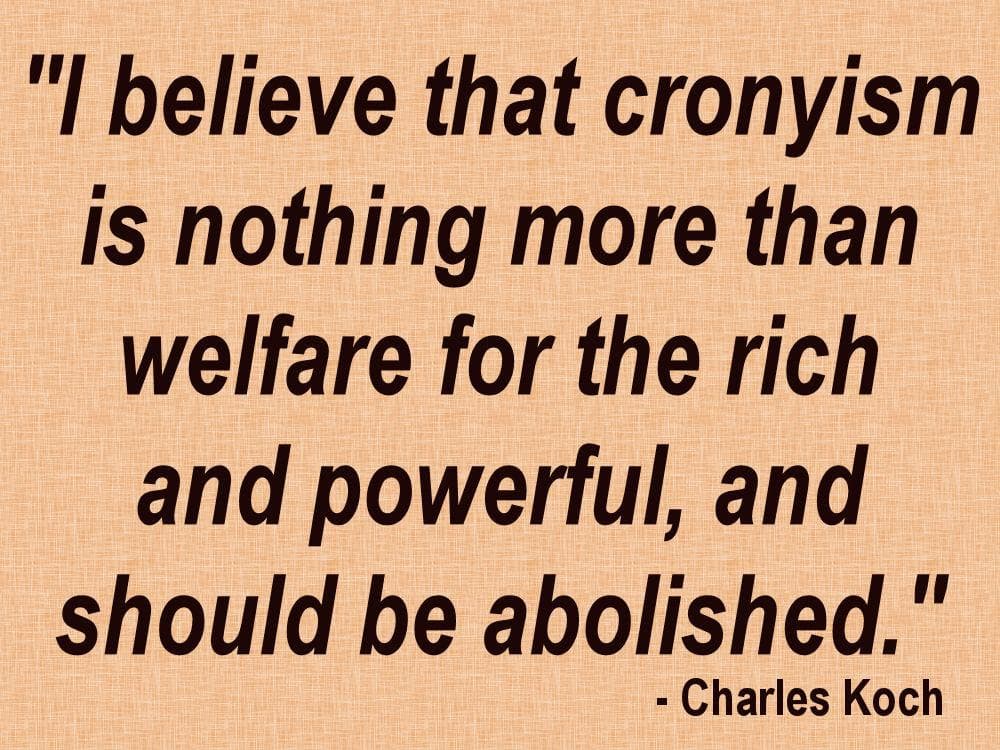Clever humans can be endlessly inventive in corrupting government powers: bribes, kickbacks, nepotism, insider tips, selective enforcement of rules, threats … the list is long.
Cronyism is the practice of using government power to benefit those with special connections—usually politicians and special interests in business, unions, environmental groups, friends, and family members.
For example, the nephew of a politician will receive a subsidy for his business, or two politicians will trade favors that enrich both, the head of an opera association will give free tickets to an opera-loving regulator to induce a tax-exemption, the head of an environmental organization with a lovely home will induce a regulator to declare a neighboring parcel of land off limits to development.
Everyone officially condemns those practices, yet our success at preventing them is limited. That’s because we typically get the source of the problem wrong.
The most common blame-label is “crony capitalism.” Note that label assumes the corruption occurs within capitalism. When the abuses occur under socialism—as in Cuba, Venezuela, or North Korea—we call them “crony socialism.”
But our system is neither capitalist nor socialist, so we need a better label.
Free-market capitalism on principle separates government and the economy as much as possible—for the same reasons that religious freedom requires separating the government from religion as much as possible.
Socialism, by contrast subsumes the economy under the government as much as possible—for the same reasons that it makes all human activities, religion included, matters of government control.
Our system, by contrast, tries to split the difference and deliberately integrates the government and the economy—but without nationalizing most property as socialist systems do.
We use various labels for the unwieldy hybrid: Interventionism, the Administrative State, the Mixed Economy, or the Third-Way, which was the preferred label of President Bill Clinton and Prime Minister Tony Blair in the 1990s, General Electric CEO Jeff Immelt in the 2000s, and current British Prime Minister Theresa May in the 2010s. What they all have in common is urging that business power and government power work hand in hand.
Simple logic predicts that cronyism will increase in the Third-Way systems. Give politicians control over more of the economy, and of course more businesses will try to influence those politicians and of course more politicians will use their power to benefit themselves and their friends. The system incentivizes corruption from both sides.
When former President Obama’s administration put $700 billion of TARP funds on the table for distribution, it caused a feeding frenzy. In that ensuing feeding frenzy, how many of those billions went to the connected and the unscrupulous and how many went to businesses that had a genuine economic case to make? President Trump arrived in the government’s chief executive office as a billionaire businessman. How many of the administration’s decisions will be made exclusively on the basis of what’s best for American interests and how much will be influenced by personal business interests?
The point is that crony capitalism is a misnomer. We currently have an economy characterized by zones of semi-free markets within a giant regulatory system. And, not coincidentally, we have a lot of corruption. So when we are investigating corruptions it should at the outset be an open question whether a particular corruption emanated from the business side or the government side. Businesses can offer bribes, and government officers can demand bribes—and in a mixed economy they are expected to be working together, so both sides have further opportunities to work out mutually beneficial but corrupt arrangements.
International data also bear out the correlation between amount of corruption and amount of government control over the economy. US companies investing in foreign countries are found guilty of bribery at a rate that more-or-less matches the degree of the various foreign government’s economic management.
In the relatively free-markets, by contrast, where politicians have less control over economic decision-making, cronyism is much less and necessarily has to go underground.
So let’s just call it cronyism, and recognize that further empowering government control over the economy is a devil’s bargain.
